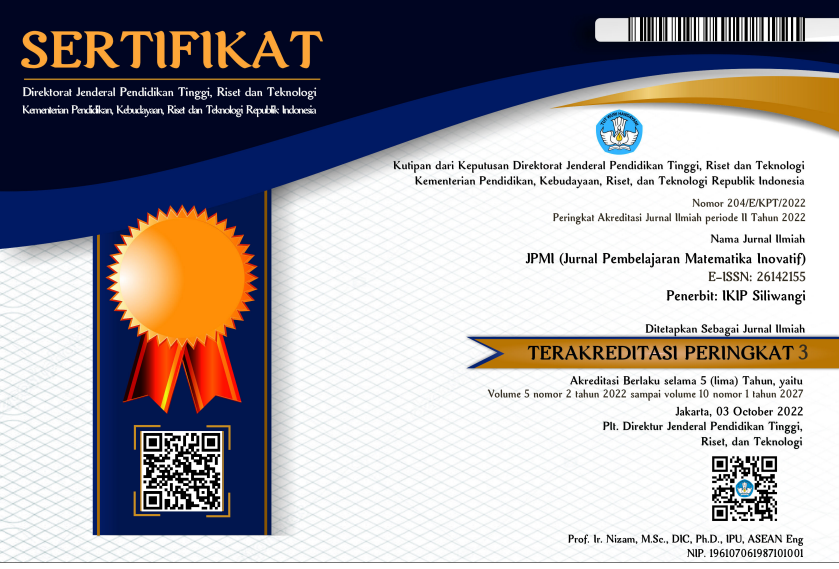Kemampuan berpikir kreatif matematis siswa SMA pada materi statistika
DOI:
https://doi.org/10.22460/jpmi.v6i4.17946Keywords:
Mathematical creative thinking skills, qualitative descriptive method, statistic subjectAbstract
References
Amaliyah, A., Rini, C. P., Hartantri, S. D., & Yuliani, S. (2021). Analisis kesulitan belajar matematika siswa kelas V SD negeri taman cibodas kecamatan periuk kota tangerang. Indonesian Journal of Elementary Education (IJOEE), 2(2), 11–20.
Ani, A., Maulana, M., & Sunaengsih, C. (2017). Pengaruh pendekatan kontekstual berbasis kecerdasan visual-spasial terhadap kemampuan pemahaman matematis siswa sekolah dasar. Jurnal Pena Ilmiah, 2(1), 971–980.
Arifin, A. A., & Ratnasari, S. (2017). Hubungan minat melanjutkan pendidikan ke perguruan tinggi dengan motivasi belajar siswa. Jurnal Konseling Andi Matappa, 1(1), 77–82.
Cahyani, I. D., Fathani, A. H., & Faradiba, S. S. (2023). Brain-based learning dalam meningkatkan kemampuan berpikir kritis siswa SMP. Jurnal Inovasi Pembelajaran Matematika: PowerMathEdu, 2(1), 113–122.
Darto, Z., & Awal, Y. (2020). Penerapan model pembelajaran kontekstual dalam meningkatkan hasil belajar matematika dengan konsep faktorisasi suku aljabar pada siswa kelas VII SMP Negeri 23 Halmahera Selatan. JIMAT: Jurnal Ilmiah Matematika, 1(1), 51–61.
Dewi, S. D. A. S., Roza, Y., & Maimunah, M. (2020). Faktor penyebab siswa tidak dapat menyelesaikan soal materi limit fungsi aljabar. Jurnal Penelitian Dan Pengkajian Ilmu Pendidikan: E-Saintika, 4(2), 134–150.
Feliarosa, D. D., & Simanjuntak, E. (2021). Self regulated learning dan prestasi belajar matematika pada siswa smalb/bx. EXPERIENTIA: Jurnal Psikologi Indonesia, 9(1), 63–70.
Hanifah, H., Sutedja, A., & Ahmaddien, I. (2020). Pengantar statistika.
Ismail, I. (2019). Guru kreatif; suatu tinjauan teoritis. Al-Qalam: Jurnal Kajian Islam Dan Pendidikan, 11(2), 15–30.
Jamil, H., & Azra, F. I. (2014). Pengaruh lingkungan keluarga dan motivasi belajar siswa terhadap hasil belajar akuntansi siswa kelas X SMK Negeri 1 Solok selatan. Journal of Economic and Economic Education, 2(2), 85–98.
Jingga, V. S., & Thamrin, H. (2022). Penanaman nilai creative thingking melalui konsep character building pada anak di rumah pintar YAFSI. Literasi: Jurnal Pengabdian Masyarakat Dan Inovasi, 2(2), 724–731.
Putra, H. D., Akhdiyat, A. M., Setiany, E. P., & Andiarani, M. (2018). Kemampuan berpikir kreatif matematik siswa SMP di cimahi. Jurnal Matematika Kreano (Kreatif-Inovatif ), 9(1), 47–53.
Putri, A. N., & Hindrasti, N. E. K. (2020). Identifikasi miskonsepsi mahasiswa pada konsep evolusi menggunakan Certainty of Response Index (CRI). Jurnal Kiprah, 8(1), 12–18.
Qomariyah, D. N., & Subekti, H. (2021). Analisis kemampuan berpikir kreatif. Pensa: E-Jurnal Pendidikan Sains, 9(2), 242–246.
Rojabiyah, A. B., & Setiawan, W. (2019). Analisis minat belajar siswa MTs kelas VII dalam pembelajaran matematik materi aljabar berdasarkan gender. Journal on Education, 1(2), 458–463.
Subekti, E. E. (2011). Menumbuh kembangkan berpikir logis dan sikap positif terhadap matematika melalui pendekatan matematika realistik. Malih Peddas (Majalah Ilmiah Pendidikan Dasar), 1(1).
Sugandi, A. I. (2019). Penerapan reciprocal teaching terhadap kemampuan berpikir kreatif dan self concept matematik siswa SMP. Jurnal Analisa, 5(2), 161–170.
Sutedja, A., Ahmaddien, I., & others. (2020). Pengantar statistika.
Ulifah, S. N., & Effendi, D. (2014). Hasil analisis kesalahan siswa dalam menyelesaikan soal matematika pada materi relasi error analysis of students in math problem solving in the matter relationship. Jurnal Pendidikan Matematika STKIP PGRI Sidoarjo, 2(1), 123–133.

















